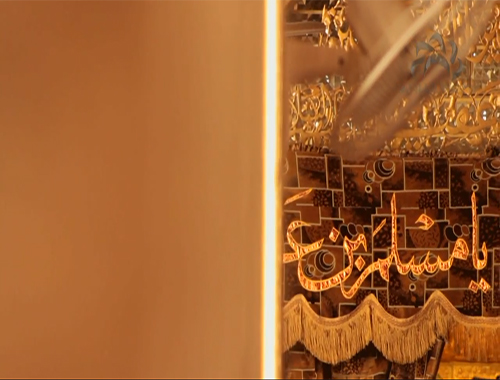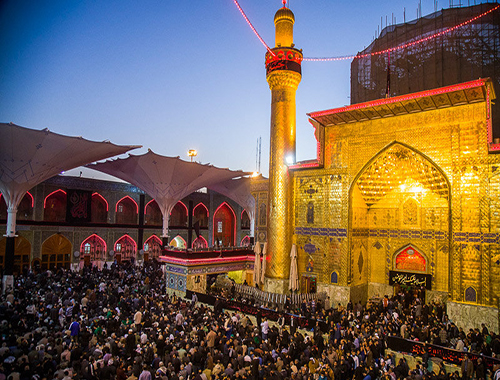Signs of Allah
- Details
- Hits: 2332
Signs of Allah
The Qur'an which is the basic source of knowing Islamic outlook on the world, repeatedly mentions the signs of Allah and requires men to think over them and through them know the Source of existence, that is Allah. For some people the consideration of these signs is a natural and simple matter. It fully convinces them of His existence. They see Him, not with their eyes but with their inner insight. But for some others it is not so simple because they are accustomed to a good deal of reasoning and analysis in the course of which they sometimes get tired of the intricacies of contrary arguments and fail to reach a definite conclusion, while others go on calmly till they arrive at a clear result.
For the help and guidance of both these classes we propose to mention some forms of recognising Allah through His signs.
(1) Phenomenon and its producer
Suppose you are having a joy ride on a bicycle. Its wheels revolve speedily and enable you to move on. Have the wheels come in motion automatically? Of course, not. It is the motion of the cog‑wheel available in the rear wheel of the bicycle which pushes it forward. But has the cog‑wheel come into motion by itself. The reply is again in the negative. It is the pressure of the motion of the chain which has brought the cog‑wheel into motion. This mechanism in its turn is moved by the pressure of your feet on the pedals. The muscles of your feet receive a signal from your brain. The signal is transmitted by your brain because you have a strong desire to have a ride. This desire may be due to boredom and overwork or your vivacity and craving for enjoyment. Both boredom and vivacity, like all other psychological states, must have some cause behind them which can be traced by some effort.
The doctrine of Causation
This and other examples common in life show that whenever man comes across a phenomenon, his mind looks for a cause, because he believes that everything has a cause. In fact the doctrine of causation is at the root of all kinds of ordinary inquiry as well as scientific research. The adherence of man to this doctrine has grown with the advancement of science and industry. A physicist, an anthropologist or a sociologist strives to discover the cause of every event only because he cannot believe that anything physical or social can happen automatically without the intervention of a cause. That is why, to ascertain the correct cause, he resorts to hundreds of tests and undertakes study and analysis. If all his tests and his study lead to a negative result, he continues his studies on the basis of some fresh theory but does not give up his efforts till the end of his life unless he arrives at some positive results. If he dies some other scientist or scientists pursue his unfinished work in the hope of finding the relevant cause or causes, but never tend to believe or suppose that anything can come into being without a cause.
In this connection it may be borne in mind that we do not strive to find out the cause of a thing which already exists as a pure reality. We strive to find out the origin and the cause of a thing only when we notice that it is a phenomenon, viz. something which did not exist previously but exists now.
If we think over this point adequately we shall see that our mind immediately on coming across a reality does not express an opinion whether it should or should not have a cause. It first looks at it to see whether it is a phenomenon, viz. whether it was non‑existent previously. In case it is a phenomenon, only then our mind decides that there should be a cause which has brought it into existence. If it is not a phenomenon, it need not have a cause. Thus all that exists does not require a cause. Only a phenomenon requires it.
A world of phenomena
Our world is full of phenomena, that is of the things which were non‑existent and are now existing and the things which do not exist, but are now coming into existence. Every phenomenon must have its producer or producers. If that producer is self‑existing, eternal and not again a phenomenon, then the whole thing is finished and there is no need to raise any further questions. But if the
producer itself is a phenomenon, then it should naturally require another producer.
The search for a producer should continue till we reach a Reality which is not a phenomenon itself. Such Reality will be Eternal and independent of any cause.
Our world being a world of phenomena is a clear sign of the existence of an Omnipotent and Omniscient Being who has produced it. Thus a sensible and inquisitive man can, through this process, find a definite proof of the existence of Allah.
(2) Homogeneity of the existing things
If we look carefully at the things existing around us we Shall find them homogeneous and their inter‑relations subject to such a definite order that arrests man's attention at his very first contact with nature. The progress of physical sciences has enabled man to have a better knowledge of this mighty system, a system pervading from the tiniest ingredients to the infinitely big ones, from the atom and its inner parts to the galaxies which are near or far, the galaxies some of which are at a distance of 350 million light years [1] from us.
The most marvelous is the system pervading the living organisms from the unicellular to the most developed animals, especially man. During your school days you must have read a lot about these things in your science books. Now study these things once more, not for the purpose of replying to the question of the teacher and securing marks and not even for the purpose of their application in the laboratories and the factories but with a view to getting yourself acquainted, to the utmost possible extent, with the vast system dominating the world. When you have refreshed your memory, then think over this question carefully. Is this vast and elaborate system not a definite sign of the existence of an Omnipotent Being, its producer?
Many scientists who have played an important role in discovering the secrets of this system, have heard their inner voice saying to them that these huge mysterious products are the signs of a great Creator, Allah, who is greater than everything and who is too great to be described.
(3) Mutual compatibility of two things not co‑existent
In this world from time to time we come across pairs of things mutually compatible but not co‑existent. For example, we see that the provision of the requirements of one thing has been made in the structure of another which came into existence earlier as if the second had been made keeping in view the demands of the first. An easily understandable example of this kind is the compatibility found between the parents and the child. Immediately after a woman, or for that matter any female of the mammalia, gets pregnant her milk glands quietly prepare themselves under the influence of particular hormones for feeding the newborn. At the time of its birth normally its food is already available. This food is completely in accord with the digestive system and the nutritional requirement of the baby and is kept stored in a suitable receptacle ‑ the mother's breast ‑ which was provided years before the birth of the baby with a nipple having tiny holes in order to facilitate the job of suckling.
It may be noted that we are not talking of the reciprocal influence of two coexisting things. Here we are concerned only with those cases in which a provision for the requirements of a thing yet to come into existence was made in the structure of another which came into existence a long time earlier. No doubt this is a sort of foresight accompanied by pre‑planning, and hence is a clear proof of the fact that all these marvels are the work of a powerful consciousness.
You cannot imagine, for example, that the bag you have in your hand might have come into existence purely in the wake of a series of unconscious actions and reactions without any conscious factor being involved. You show your hand‑bag to a materialist thinker and tell him that although normally a hand‑bag is made by a handicraftsman or a worker on machine, your particular bag, as an exceptional case, was made purely under the influence of natural factors and without the intervention of any conscious maker, and then see his reaction. If not in your presence at least in your absence he will certainly say that such and such person was talking nonsense.
This materialist thinker will not accept that there is even one per billion chance that a bag, the parts of which are cut to measurement and then sewn together, might have come into existence purely under the influence of unconscious natural factors. In other words he is certain that in the making of a bag there must be an active role of constructive consciousness. He totally rejects the theory that as an exceptional case a bag can be made by purely natural factors. In his opinion such an idea is unscientific and deserves no consideration. If we look at the idea from the standards of experimental science, again we come to the same conclusion. Long‑term experience has proved that man has more creative power than any other existing thing, and that he has more power only because of his developed consciousness, knowledge and originality and not because of any other aspect of his life. Hence it may be concluded that there exists a basic relationship between consciousness and creativeness. Therefore the theory that this marvelous system of the universe is the creation of a powerful consciousness is more plausible and in accord with experimental science than the materialistic theory that matter is the origin of all these wonders.
(4) March toward unlimited perfection
A large number of researchers after years of sustained observation, experiment and study have come to the conclusion that the universe without believing in the existence of Allah is a meaningless proposition. They say that as they went deeper into the working of the universe, they realized better that the world is constantly moving forward in a definite direction. On the whole it may be said that it is marching towards perfection without stopping at any intermediate stages of evolution. It appears to have a goal or a destination, and this goal can be nothing but boundless perfection.
That is the only goal commensurate with the evolutionary movement. It may be said that limitless perfection is a powerful magnetic pole attracting everything toward it. Without it there would have been no movement.
This kind of cognition of Allah has a long and valuable history. Besides the works of the great philosophers and mystics, there exist interesting writings of many scientists, especially astronomists, physicists, biologists, psychologists and sociologists on this subject.
The most suitable source of knowing the views of eminent scholars in this regard are the general books of the history of philosophy and the history of science. But as we like not to be influenced by the ideas of any particular persons, we avoid to quote their views.
We know a number of young men, both eastern and western, who have made a vast study of physical sciences and who, in the light of their studies, have realized that without the acknowledgement of an All‑knowing and All‑powerful Lord who created this universe and who is managing its affairs, the entire system of the world appears to be meaningless and absurd.
(5) Eloquent signs
Every phenomenon needs a producer. The chain of producers continues till we reach a producer independent and All‑powerful.
The whole universe is moving and marching forward. This movement must have a goal.
These are clear signs of the existence of Allah. They tell us about Him, but not in words. That is why what they say may not be intelligible to many and may not give satisfaction to them. We advise such people to look directly for the eloquent signs which talk to us in our own language. These eloquent signs are the prophets. For those who are convinced of their prophethood after enough study, the prophets automatically become the natural and eloquent signs of the existence of Allah. As every prophet claims to have contact with Allah by means of revelation and says that he has been detailed by Him to guide the people, we should, in the first instance, look at what they say as a claim and that too a big and extraordinary claim which cannot be accepted easily on its face value.
There have been many who claimed to be prophets, but when later they faced hardship, they openly confessed to be false pretenders.
Hence when we find a person claiming to be a prophet we should carefully scrutinize his claim and should accept it only when it is fully proved. Anyhow, once we have acknowledged the claim of a person to be a prophet, we automatically have to acknowledge the existence of Allah.
The most natural way of scrutinizing such a claim is to study the life of the claimant and to see what sort of a man he is. How far was he reliable during the period prior to his claim? Is he an impostor who wants to impose himself upon the people or a self‑seeker who has chosen this convenient way to acquire wealth and honor? Or is he a man of integrity whose character is above suspicion? It is also to be seen how sensible and sagacious he is. He should not be a simpleton who may be misled by others or a visionary who may be carried by his own fantasy into the belief that he is a prophet. He should be a man endowed not only with commonsense, but also with the wonderful power of leadership and a natural ability to perform great deeds.
Normally everybody knows closely one or more persons in whose integrity and purity he has full confidence. This confidence develops as the result of a close study of their life and character for a long time. There may be people who personally have not met such persons, but they are convinced of their uprightness and reliability after an all‑round inquiry.











